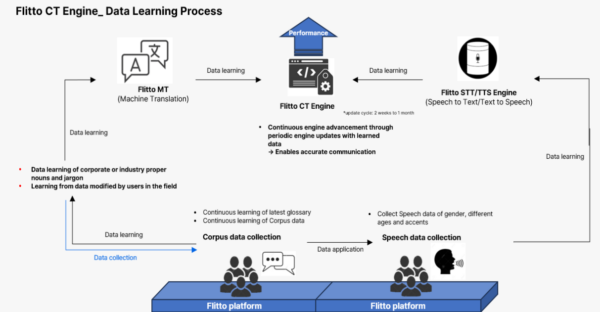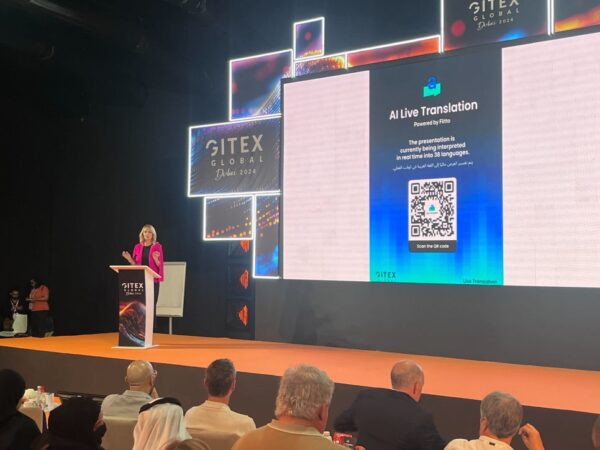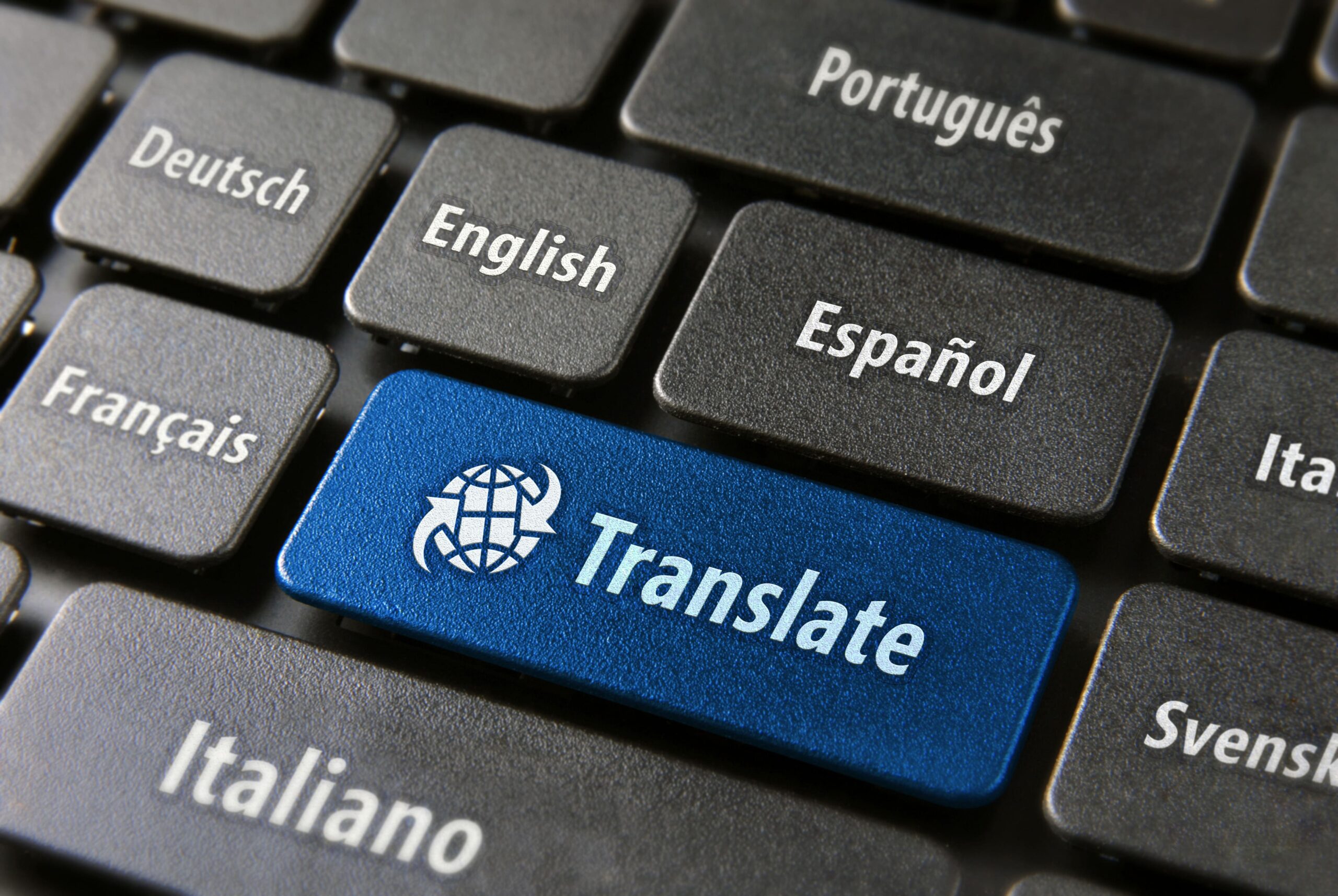Introduction
Data is essential for ensuring the accuracy and effectiveness of language solutions. It’s not just about feeding large volumes of information into AI systems—it’s about training the technology with the right kind of data to ensure precise and relevant translations. However, challenges arise in collecting diverse, high-quality data.
In this post, we’ll dive into the role of data in AI translation, the obstacles faced when collecting it, and how Flitto is addressing these challenges through its crowdsourcing platform.
The Role of Data in AI Translation
Data is the foundation of AI translation systems. Just as humans rely on prior knowledge to translate, AI models use large datasets to learn language patterns. For AI translation to be accurate, it needs diverse data that reflects real-world usage. This includes everything from everyday conversations to specialized technical texts. Such data helps AI understand language patterns, context, tone, and domain-specific vocabulary.
AI translation models rely heavily on parallel corpora—sets of translated texts in multiple languages. These corpora teach the AI the relationships between words and phrases. The more data these models are exposed to, the better they become at capturing nuances like word order, grammar, and idiomatic expressions. This continuous training improves the AI’s ability to offer real-time, accurate translations that are contextually relevant. Data is not just important; it is the backbone of AI translation, shaping both quality and versatility.
However, not all data is equal. The quality and variety of the data used to train AI systems directly impact performance. High-quality data ensures precise translations, while diverse datasets allow the AI to adapt to different language styles and industries. For these reasons, training your AI with data that is both high-quality and diverse is essential.
Challenges in Collecting Data for AI Translation
However, collecting such data comes with numerous challenges that can impact the accuracy and reliability of AI translations.
Low-resource Languages
One major issue is acquiring data for low-resource languages. These languages are less spoken or have little digital presence, such as endangered languages or indigenous languages. To work effectively, AI systems need substantial amounts of data for these languages. However, the lack of digital content often means there is not enough data to train the AI, leading to less accurate translations.
Specialized Terminology
Another challenge is domain-specific translation, especially with technical or industry-specific terms. Translating medical, legal, or scientific content requires understanding specialized terminology. These terms often don’t appear in general datasets and aren’t used in everyday conversations. As a result, AI systems may struggle with accuracy in these areas, leading to errors that could cause miscommunication in critical fields like healthcare or law.
Linguistic Diversity
Lastly, ensuring the diversity within a language is another significant challenge. Even for widely spoken languages, collecting enough varied data is difficult. Data must reflect different language registers (formal, informal, technical, conversational) and cultural contexts. Slang, idiomatic expressions, and regional language differences are often left out. Without a diverse dataset, AI translation may fail to capture the true meaning behind words.
How Flitto Overcomes Data Challenges
To overcome challenges in AI translation, the solution lies in well-defined, diverse data. At Flitto, a leading provider of language data and AI-powered multilingual solutions, we address these challenges with a tailored approach. In this section, we’ll explore how Flitto tackles these issues and what makes our solutions stand out.
Diversity: Data Collection Through Crowdsourcing Platform
Flitto’s crowdsourcing platform, powered by 14 million users from 174 countries, serves as a robust system for gathering diverse datasets. We use our own platform called ‘Arcade‘. By leveraging the collective intelligence of users, Flitto ensures that the collected data reflects real-world language use across various regions, styles, and contexts. This dynamic system not only gathers data efficiently but also creates a continuous feedback loop for refining AI translation engines.
Participants on the platform contribute text and speech data through creative missions in the form of gamification. For instance, Speech Missions require users to create natural sentences using provided keywords, capturing diverse speaking styles, accents, and tones. This data is essential for training AI engines in speech-related applications, ensuring accurate real-world performance. Listening Missions focus on validating AI’s transcriptions by comparing them to audio samples. This process improves the quality of datasets for STT and TTS technologies, enhancing AI performance in speech-to-text and text-to-speech applications.
Flitto has also addressed the challenge of specialized terminology by leveraging our crowdsourcing platform. By incorporating industry-specific jargon into Arcade missions, we collect the data to train our AI effectively. This is why our AI language solutions, powered by our proprietary CT engine, have garnered attention for their exceptionally accurate translations of proper nouns and specialized terms at global events.

High-Quality: Multi-Layered Validation Process
Flitto ensures the accuracy and reliability of the data collected through a rigorous validation process. First, after gathering data through the platform, we employ a crowdsourced validation method. In this process, at least three independent reviewers assess the AI-generated translation or transcription to verify its correctness. The final result of the sentence is determined based on the decisions of each reviewer. This ensures the data is refined and accurate, with the input of multiple individuals contributing to the overall quality.
Then, Flitto’s internal team of expert translators steps in to make the final determination for sentences with unclear or ambiguous points. This ensures that even complex cases are evaluated thoroughly. By combining crowdsourcing and expert review, Flitto ensures that all data used to train AI systems meets the highest standards of quality. This multi-layered validation process is key to delivering accurate, contextually relevant translations and language solutions for a variety of industries and applications.

Building AI Language Solutions from Data
By leveraging large, high-quality data collection, Flitto’s AI-powered language solutions have been developed. These solutions offer outstanding AI simultaneous interpretation by using well-defined language data.
Flitto’s three AI real-time interpretation solutions—Live Translation, Chat Translation, and Chat Translation Enterprise—are actively utilized both domestically and internationally. Among them, Live Translation, designed for conferences and seminars, has been making waves at major global events. Notably, in October this year, Flitto provided AI simultaneous interpretation at GITEX Global, the world’s largest tech event held in Dubai, UAE. With over 6,500 exhibitors and 1,200 investment institutions from 180 countries, the event was a massive scale. Flitto successfully provided interpretation services for the event and received positive feedback from the event organizers. In this way, Flitto’s Live Translation has been deployed at various other international events across the US, Japan, Taiwan, and more, continuing to make an impact worldwide.

Chat Translation Enterprise, a conversational AI translation solution, is actively being implemented in a variety of settings. This service can be utilized anywhere global communication is required, including airports, tourist centers, and casinos. For example, Chat Translation Enterprise has been introduced at Incheon International Airport, the largest international airport in South Korea. At the key locations such as the main information desk and lost-and-found office, it provides AI real-time interpretation service that enhances staff efficiency and facilitates seamless communication.

Conclusion
This is how Flitto supports the advancement of AI translation worldwide. By providing sets of language corpora, we offer other companies the opportunity to harness the power of AI translation for their own needs. Along with data solutions, Flitto provides AI language solutions, powered by our proprietary CT Engine, contributing to a world without language barriers.
Data is more than just the foundation of AI translation—it’s what makes accurate, nuanced communication possible across languages and industries. By continuously improving how we collect and utilize data, Flitto is not only enhancing the capabilities of our AI language solutions but also proving other companies with the opportunity to unlock the potential of AI advancement. As the demand for effective AI translation continues to grow, the role of data will only become more pivotal in shaping the future of global communication.
